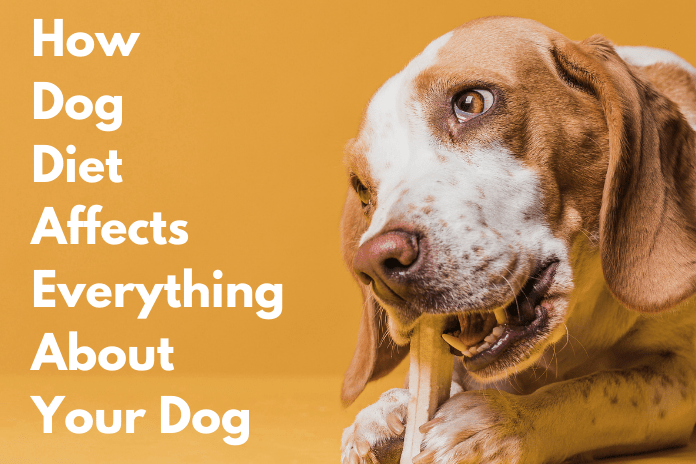From the time you bring your little furry friend home, you’ll want to ensure that they are healthy, happy, and active. Their overall well-being and quality of life depend on one key factor – dog nutrition. As your vet will explain, a balanced diet with an ideal blend of carbohydrates, proteins, fats, vitamins, and minerals will ensure that your pooch develops and grows normally and is in top physical and mental condition.
Nutrition Plans Should be Designed Carefully
When choosing the best diet for your four-legged friends, it is advisable to put together a selection of foods customized to meet their nutritional needs. Several factors will influence the type and quantity of food and kibble you serve. For instance:Puppies need adequate nutrition to grow properly into adulthood. You’ll provide them about twice the total number of calories per pound of body weight as an adult dog of the same breed. The right age to start with supplemental food is at 4 to 5 weeks, after which the mother’s milk is inadequate.
Some breeds require more calories than others since they are more active and expend more energy. A good example is a border collie that will likely need more food than a basset hound of the same weight. Smaller dogs may also need more calories because of their higher metabolism.
Senior dogs may need fewer calories, but a high protein dog food is important since their digestive systems are not strong enough to assimilate proteins at peak efficiency.
Like humans, canines can also have allergies to certain foods. The surprising thing is that, often, dogs suddenly develop sensitivity even after eating the same diet for years. Their immune systems may start reacting to certain foods in their diets. Your vet can help you identify the specific ingredients you should eliminate like beef, corn, chicken, rice, eggs, and wheat.
Most dogs tend to overeat and become obese if their portion sizes are not controlled. You’ll put out a bowl with carefully-measured portions at fixed times during the day. Also, keep watch on the table scraps you share with your little furry buddy.
Rely on your vet’s advice for the right dog food brands containing the blend of nutrients your pet absolutely needs.
Improper Nutrition Can Lead to Several Health Issues
Improper nutrition can lead to deficiencies and several health issues that can be easily avoided. Here are some of the most common conditions you should worry about:
Obesity and Related Problems
Similar to humans, eating a high-carb, high-sugar diet, and inadequate exercise can lead to obesity. Your little friend risks related illnesses like diabetes, arthritis, low energy levels, joint pain, and intolerance to physical activity. Obesity is also one reason why so many dogs tear both ACLs on the opposite knee joints. The excess weight stresses the ligaments in their knees, leading to pain and swelling. Surgery may also be needed to correct the problems.
Suggested: 46 Toxic Foods For Dogs
Dry Skin and Dull Coat
Inadequate nutrition reflects on your four-legged friend’s skin and fur. You might notice that their skin is red, itchy, and seems flaky. A dull, dry, greasy coat with hair loss in clumps is a symptom that you need to take a closer look at your buddy’s diet. Add natural sources of proteins and essential fatty acids – specifically Omega 3. Vitamins like A, B-complex, and E are also crucial for a healthy, glossy coat. Vets advise you to select a combination of protein sources and keep rotating your choices.
Inefficient Digestion
Symptoms of improper digestion include vomiting, flatulence, diarrhea, and loose or smelly stools. Your pet might also have belching and/or stomach rumbling. All these are signs that the little guy’s digestive system cannot absorb essential vitamins and nutrients. Your vet can help you isolate the particular proteins, fibers, and fats that could be irritating the sensitive intestinal lining.
Diseases
Synthetic, store-bought dog foods could have a high carbohydrate, sugar, and fat content. Some brands also contain meat and meat products that are typically considered unfit for human consumption. Feeding your pooch on these foods could lead to heart disease, kidney disease, diabetes, pancreatitis, and various others. Cooking meals at home is a good option. So, get expert advice on the table food you can safely share with the furry members of your household.
Aggressive Behavior and Anxiety
While insufficient proteins can adversely affect your furry buddy’s health, the reverse is also true. Excessive protein in their diet limits the production of serotonin or the “happy” hormone. So if the little guy seems overly aggressive, you might want to put them on a low protein diet. Alternatively, add foods that raise tryptophan levels that control their moods. Cheese, oats, eggs, and yeast are good sources of tryptophan. If you’re noticing hyperactivity, you might want to cut back on the sugar content in their food.
Gum Disease
Dogs are prone to developing dental issues like red, inflamed gums, stained teeth, and bad breath. And the problem could be – kibble, which is high in carbohydrates. Refined carbs tend to break down into simple sugars that promote the growth of dental bacteria. Switch out unhealthy carbs and replace them with healthier foods like beef, chicken, vegetables, eggs, yogurt, and cottage cheese.
The right diet plan for your little doggo is one that is best suited for their size, weight, breed, and any other requirements like allergies and food intolerances. Work with your vet to understand the pupper’s specific needs and make sure to feel them the right food for perfect health and wellness.
Suggested: 52+ Human Foods Dogs Can Eat Too!
Thanks for reading through the article, I hope you enjoyed it!
Make sure to Subscribe to our newsletter, follow us on Instagram, and Subscribe to our YouTube channel!
Cheers!












